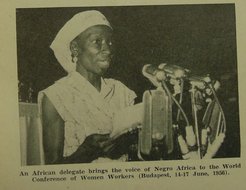Communist trade union activists and their global entanglements in the second half of the 20th century
Research Project

“Out of the enormous horrors of World War II came a hope for the creation of a peaceful and just world order. For a short time in the mid-1940s this dream seemed on the verge of realization as the nations of the earth, after vanquishing the threat of fascism, attempted to create new structures of international relations,” writes Victor Silverman in his book on the World Federation of Trade Unions (WFTU) in the 1940s, which for four years united the global movement of workers of all political orientations.1 This period, marked by euphoria and international enthusiasm, also brought marginalised groups into the centre of discussions. Appeals were made from all sides for global solidarity and the elimination of social inequalities.
The project examines this phase of awakening with a view to communist trade union activists who were active in the WFTU. It explores the question of which pre- and inter-war networks extended into the Cold War phase and whether these changed as a result of historical events and ruptures. The mobility of communist trade unionists is traced on the basis of the biographies of individual actors, thus shedding light on the development of the international trade union movement.
The project focuses on two topics that have so far remained neglected in research: firstly, the role of the WFTU in the discussion on equal pay at the end of the 1940s, in which women trade unionists in particular took part and struggled for equal treatment in the world of work; secondly, the positioning of the WFTU in the de-colonisation debate and the influence of actors from the Global South on this field, which was strongly debated in the trade union movement.
For the analysis, sources from the WFTU and ICFTU archives of the International Institute of Social History (IISH) in Amsterdam are consulted.
The project was supported by a research grant from the German Research Foundation at the IISH in Amsterdam from 09/2020 to 06/2021.
Presentations
Der Weltgewerkschaftsbund und der Globale Süden, Hermann Weber Konferenz: Von der Internationale zur Völkerfreundschaft. Kommunismus und Transnationalität im 20. Jahrhundert, Frankfurt/Oder, 11.-13.06.2024.
“What is our future status?” The Indian Perspective on the World Federation of Trade Unions in the late 1940s, International Conference: 14th European Social Science History Conference, University of Gothenburg, 12.04.-15.04.2023.
“Women as Workers”. Discussions about Equal Pay in the World Federation of Trade Unions in the late 1940s, International Conference: Women’s Labour Activism in Eastern Europe and Beyond 19th and 20th Centuries, Central European University, Vienna, 14.10.–16.10.2021.
„Women as Workers.“ Die Auseinandersetzung um gleiche und gleichwertige Arbeit in der internationalen Gewerkschaftsbewegung der 1940er und 1950erJahre, Tagung: Gender Pay Gap. Vom Wert und Unwert von Arbeit, Friedrich-Ebert-Stiftung und Hans-Böckler-Stiftung, online, 22.04.–23.04.2021.
Publications
Wolf, J.: "Women as Workers". Discussions about Equal Pay in the World Federation of Trade Unions in the Late 1940s. In: Through the Prism of Gender and Work. Women’s Labour Struggles in Central and Eastern Europe and Beyond, 19th and 20th Centuries, S. 202 - 230 (Hg. Çağatay, S.; Ghiț, A.; Gnydiuk, O.; Helfert, V.; Masheva, I. et al.). Brill, Leiden; Boston (2024)
Wolf, J.: "Women as Workers". Diskussionen über die Berufstätigkeit von Frauen und Lohngleichheit in der internationalen Gewerkschaftsbewegung der späten 1940er-Jahre. In: Gender Pay Gap: Vom Wert und Unwert von Arbeit, S. 219 - 242 (Hg. Wiede, W.; Wolf, J.; Fattmann, R.). Dietz-Verlag, Bonn (2023)
1 Silverman, Victor. Imagining Internationalism in American and British Labor, 1939-49. The Working Class in American History. Urbana, Ill. etc.: University of Illinois Press, 2000, 1.
